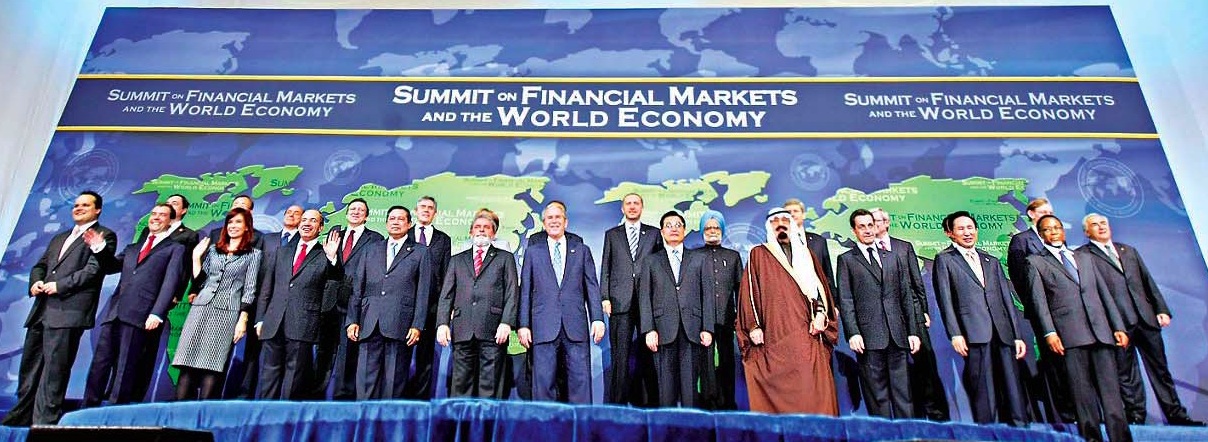|
Soc 490: Senior Seminar in Sociology
Spring 2010 Instructor: Dr. Gonzalo Santos     Dr. Santos' Office: DDH-AA205 Phone: 661 654-2191 Office Hours: 11:00 - 12:30 pm MWF. |
|
Soc 490: Senior Seminar in Sociology
Spring 2010 Instructor: Dr. Gonzalo Santos     Dr. Santos' Office: DDH-AA205 Phone: 661 654-2191 Office Hours: 11:00 - 12:30 pm MWF. |
Textbooks:
Course Content:
This Senior Seminar in Sociology will focus on the theories and
dynamics of
global integration in the contemporary social world, how it affects,
and in
turn is
affected by, the world's
economic, political, cultural and social structures, trends, and
processes. First, using the Steger anthology of
articles, we'll analyze some of the key theoretical perspectives on the
origins, many structural dimensions, consequences, and contemporary
trends and challenges of globalization, from some of the
principal scholars in the field. Then, using the McMichael anthology,
which analyze case studies from specific countries, we explore the many
ways humans react collectively, from the bottom up, through social
movements of all sorts, to globalization, and in so doing, change the
pace and direction of globalization itself. We will also read three
articles from Dr. Santos web site: one on the nature of anti-systemic
movements since 9/11/01 and two on the origins and nature of the US and
worldwide severe economic crisis since 2007.
Course Structure:
The course will be run as a seminar. Students will form eight
groups
of mostly three students each and take turns introducing and
analyzing
the assigned
readings for
each
seminar session, followed by class discussion. In this manner, each
group will make class presentations twice during the quarter.
Attendance is mandatory (please,
no
tardiness or early departures). All
students must come prepared to discuss the readings.
The students will also collaborate within their groups to produce:
a) a
research project on a topic
related
to the course; each student will contribute their own research paper as
part of the project.
b) a group portfolio containing each of the students' curriculum vitae and a letter of application
to a graduate school or professional job. Use this rubric for guidance:
click here.
Each student presentation will be graded based on: (a) the
analytical
strength of the presentation, including its depth & breath (how
well it covers all the main aspects), (b) the pertinence and quality of
the
question(s) posed at the
end, (c) the quality & style of the oral delivery, and (d) the
quality of the visual presentation, including charts, tables, figures,
and images.
Research Paper: Each student group will design and organize a research volume of individual research papers on a topic related to the main areas of the course. Each volume will contain 2 or 3 individual research papers related to different aspects of the volume's topic. The papers need to be submitted in both electronic form and printed on paper. The volume is due on Thursday, June 10, before noon, at Dr. Santos' office.
All topics - the group's general topic as well as each individual's subtopic - must be pre-approved by Dr. Santos no later than May 12.
Each printed volume should be bound and include a title page and a table of content, listing each paper by title and student author. Each individual paper should be between 10 and 12 pages long (excluding the bibliography). For a precise guide on the paper's format and citation style, go to:
http://www.csubak.edu/~gsantos/guide-paper.htmlEach individual paper should pose a central argument, or thesis, or hypothesis, and include the following sections: an introduction, stating the thesis/topic, a literature review as well as the theoretical approach and methodological framework of the paper; an analytical section on the relevant historical & contemporary processes, facts, data, related to the topic; this section should not only be descriptive, but it should include your critical analysis to explain these things, as well as other plausible alternative explanations in the literature and your critique of them; your summary and main conclusions; a bibliography; appendices (if any). The bibliography ought to reflect a good search on the World Wide Web, as well as consulted books and scholarly journals in the library. Appendices should include charts, graphs, and figures covering the pertinent topic - the better selected, relevant, and more global in nature, the better. No need for a group bibliography or consistent pagination - each papers' own will suffice.
Plagiarism: To
prevent students from wittingly or unwittingly engaging in plagiarism,
Dr. Santos strongly recommends students to carefully read and abide by
the document CSUB
Classifications of Plagiarism found at: http://www.csub.edu/tlc/options/resources/plagiarism/4plagiarimclassifications.htm.
Schedule of Reading Assignment
| Week |
Monday | Wednesday |
|
1
March 29, 31 |
INTRODUCTION |
HOLIDAY César Chávez Day |
|
2
April5, 7 |
Dr.
Santos
Steger
Reader:Introduction: The emergence of Global Studies |
Group 1:
Steger Reader:Articles 1: The Globalization of Markets, by T. Levitt Article 2: Disjuncture & Difference in the Global Cultural Economy, by A. Appadurai |
|
3
April12, 14 |
Group 2:
Steger Reader:Articles 3: The Globalization of modernity, by A. Giddens Article 4: Mapping thre Global Condition, by R. Robertson |
Group 3:
Steger Reader:Article 5: Globalization: The Necessary Myth?, by P. Hirst & G. Thompson Article 6: Preface to Empire, by M. Hardt & A. Negri |
|
4
April19, 21 |
Group 4:
Steger Reader:Article 7: The Global City Model, by S. Sassen Article 8: The Globalization of Sexual Identities, by D. Altman |
Group 5:
Steger Reader:Article 9: Globalization: An Ascendant Paradigm?, by J. Mittleman Article 10: The Promise of Global Institutions, by J. |
|
5
April26, 28 |
Group 6:
Steger Reader:Article 11: Five Meanings of Global Civil Society, by M. Kaldor Article 12: Al Qaeda & the New Terrorists, by Oliver Roy |
Group 7:
Steger Reader:Article 13: From Market Globalism to Imperial Globalism: Ideology & American Power after 9/11, by M. Steger Article 14: The World as a Polder, by J. Diamond |
|
6
May3, 5 |
Group 8:
Steger Reader:Article 15: The Specter that Haunts the Global Economy: The Challenge of Global Feminism, by V. Moghadam Article 16: Arguing Globalizations, by P. James |
Group 1:
Steger Reader:Article 17: The Urban Climacteric, By M. Davis Article 18: The New Public Sphere: Global Civil Society, Communication Network, and Gloabl Governance, by M. Castells |
|
7
May10, 12 |
Group 2:
Steger Reader:Article 19: Globalization and the Emergence of the World Social Forums, by J. Smith & M. Karides Article 20: Globalization: Long Term Process or New Era in Human Affairs, by W. McNeill |
Group 3:
Web Readings:Immanuel Wallerstein: New Revolts Against the System Immanuel Wallerstein: Systemic Crises Robert Wade: Financial Regime Change? |
|
8
May17, 19 |
Group 4:
McMichael Reader:Articles 1, 2, 3, |
Group 5:
McMichael Reader:Articles 4, 5, 6 |
|
9
May24, 26 |
Group 6:
McMichael Reader:Articles 7, 8, 9, |
Group 7:
McMichael Reader:Articles 10, 11, 12 |
|
10
May 31June 2 |
HOLIDAY Memorial Day |
Group 8:
McMichael Reader:Articles 13, 14, 15 |
|
11
June 7 |
FURLOUGH DAY
- NO CLASS |
Research papers and Student Portfolios
are due by noon, Thursday, June 10, at Dr. Santos's office. |
My other group members' names, phones & email addresses are:
1.
____________________________________________________________________________________
2. ____________________________________________________________________________________
Date: My own presentation will be on:
1. _________________________________________________________________
2.
_________________________________________________________________